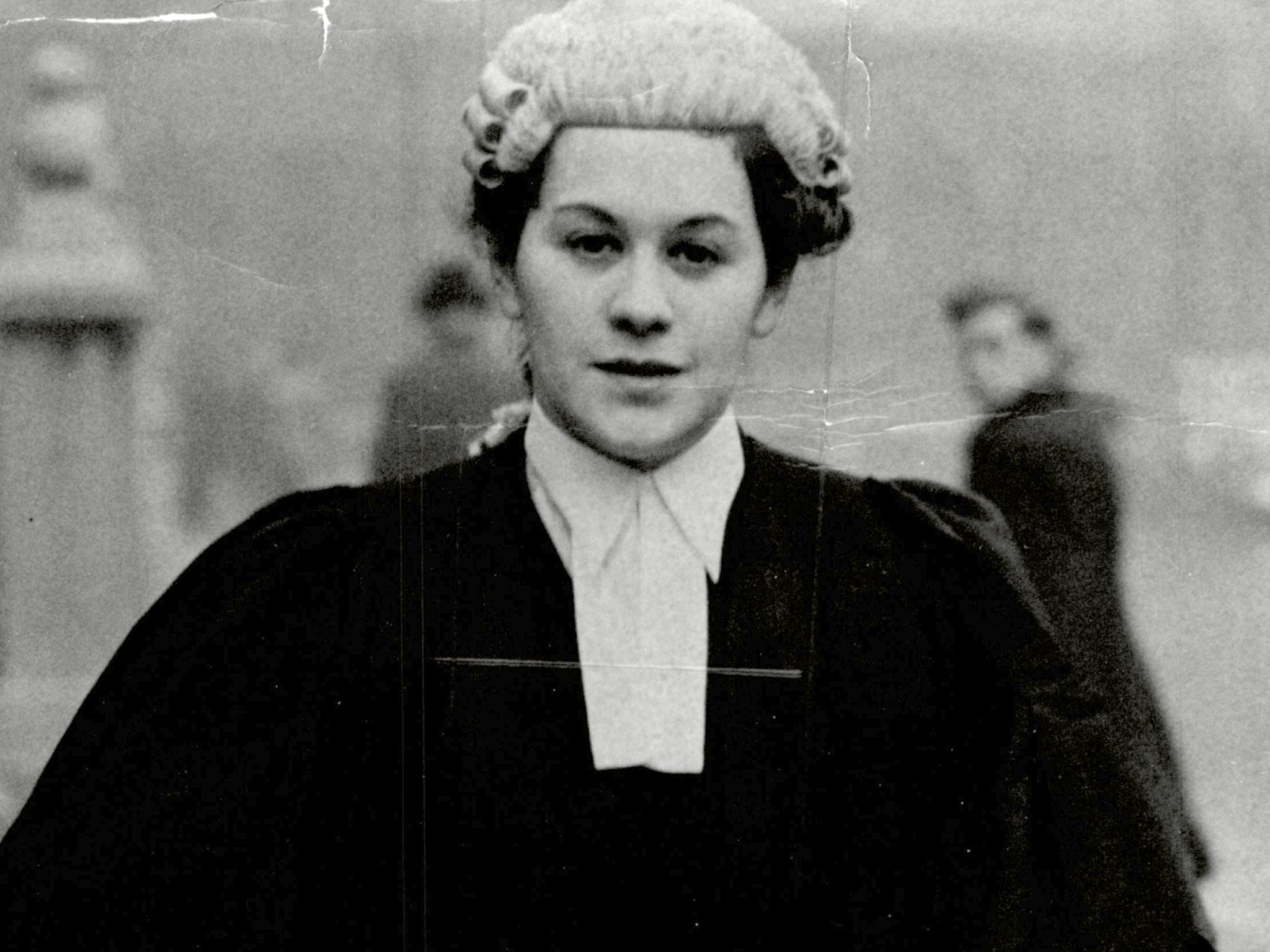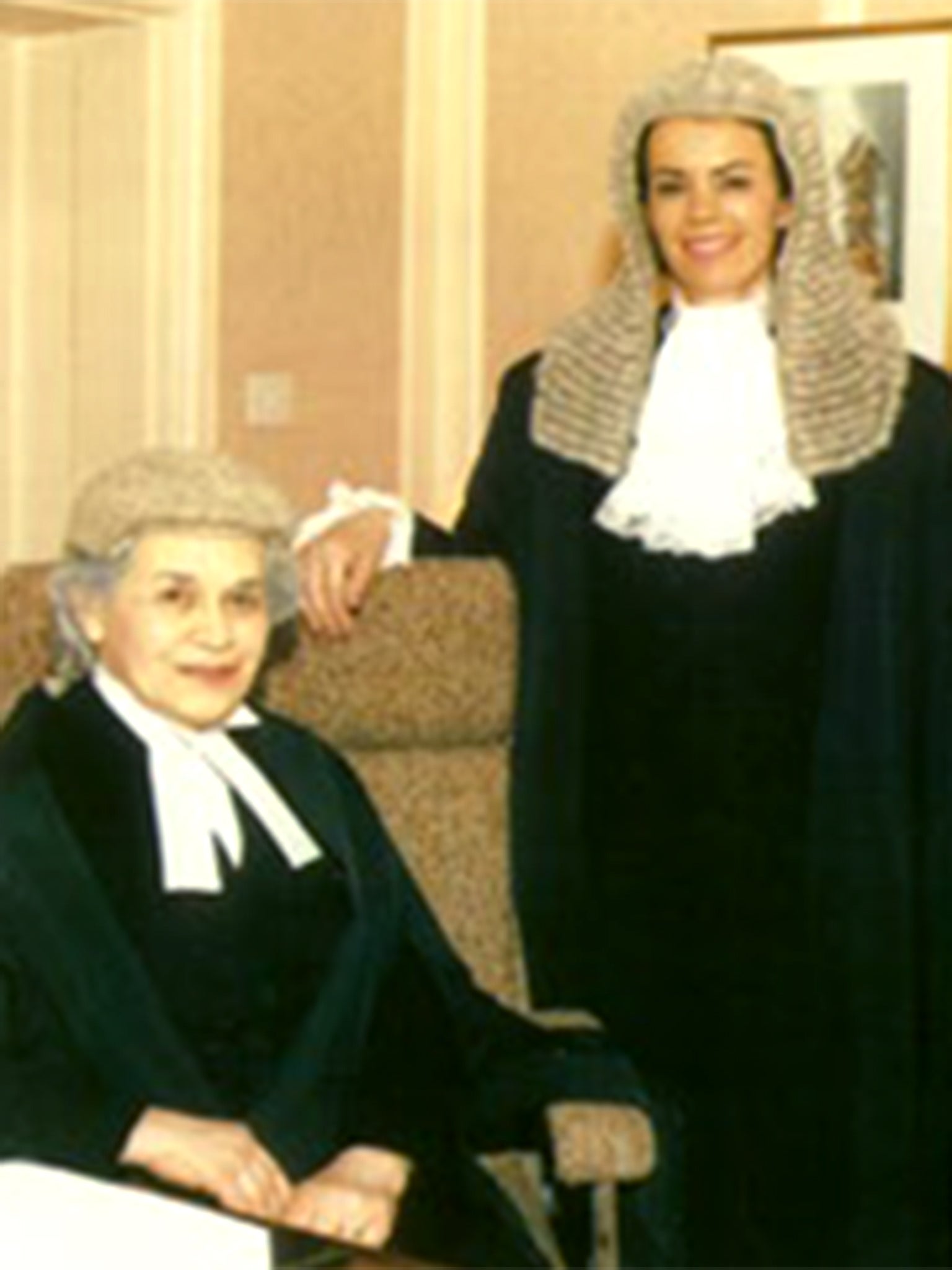‘Juries hung on her every word’: Daughter of first female Old Bailey judge reflects on mother’s 50 year legacy
‘She broke several glass ceilings and as such was a real trailblazer and pioneer in the law remembered to this day,’ Hilary Heilbron QC tells Maya Oppenheim


Your support helps us to tell the story
From reproductive rights to climate change to Big Tech, The Independent is on the ground when the story is developing. Whether it's investigating the financials of Elon Musk's pro-Trump PAC or producing our latest documentary, 'The A Word', which shines a light on the American women fighting for reproductive rights, we know how important it is to parse out the facts from the messaging.
At such a critical moment in US history, we need reporters on the ground. Your donation allows us to keep sending journalists to speak to both sides of the story.
The Independent is trusted by Americans across the entire political spectrum. And unlike many other quality news outlets, we choose not to lock Americans out of our reporting and analysis with paywalls. We believe quality journalism should be available to everyone, paid for by those who can afford it.
Your support makes all the difference.Rose Heilbron QC’s legal career was littered with a series of firsts. From being the first female judge to sit at the Old Bailey to being the first woman to lead in a murder case, and the first to be a silk, Dame Heilbron rapidly became a household name during her lifetime.
But it was not devoid of obstacles, with Hilary Heilbron QC, her 72-year-old daughter, saying it took her mother far longer to land promotions than her male counterparts.
Speaking to The Independent on the 50th anniversary of Dame Heilbron becoming the first female judge to sit at the Old Bailey, she noted her mother had been blocked from attending social events held by the Northern Circuit – a group of barristers who practice in the north west of England.
“She was banned from the bar mess, which was a meeting of barristers getting drunk and telling naughty stories, on the Northern Circuit,” Ms Heilbron reflects. “It was difficult for her to get prosecution work but she got there. There was definitely prejudice against women, but it was not always in your face.”
Law was a male-dominated profession at the time, with women barred from becoming lawyers, barristers and magistrates until the 1919 Sex Disqualification (Removal) Act.
Juries hung on her every word. She became an icon at the time. She became very much a role model for people looking for a career in the law
“Back in those days, people were sent to gallows. People were queuing around the block to sit in on court hearings for her cases,” Ms Heilbron says of her mother, who specialised in criminal law.
“There was no TV then. It was partly ghoulish and partly genuine interest. Also, people came to listen to her because she had such a reputation. Juries hung on her every word. She became an icon at the time. She became very much a role model for people looking for a career in the law.”
When probed about what stirred her mother to become a barrister, she says she had never wholly got to the bottom of this, but that her late grandmother, to whom her mother was very close, had encouraged her.
“She won quite a few medals in drama,” Ms Heilbron says of her mother, who died in 2005 at the age of 91. “She was a very good advocate. They couldn’t say to her what they said to other women – that they had a high-pitched voice that shrieked when they raised it.”
Her mother had a “brilliant mind”, she adds, noting that were only 12 women out of 313 on the Northern Circuit when she started. “My sense is the law attracted men from public school, mostly, in those days – and few women. It reflected society as a whole at the time.”
Ms Heilbron says her mother’s decision to juggle motherhood with work inspired a “new generation of women” in the post-war period to take up a career.

“Her fame and the publicity surrounding her and her success in a number of notorious cases enabled her to become a role model to a wide audience of aspiring women,” she adds. “She showed what a woman could achieve with hard work and dedication, and she broke several glass ceilings, and as such was a real trailblazer and pioneer in the law, remembered to this day for the part she played in encouraging women in the law.”
Dame Heilbron, who became the first female judge to sit at the Old Bailey, on 4 January 1972, acted for Jack “Spot” Comer, a notorious east London gangster, during her career. Born in 1914 in Liverpool, she lived there for many years before moving to London with her husband, Dr Nathaniel Burstein, a GP, when she became the second woman to become a high court judge – following in the footsteps of Elizabeth Lane.
The legal pioneer, who kept her maiden name, grew up in a Jewish family, with her father Max Heilbron, a hotelier, running a boarding house for Jewish refugees.
“She was humble and retiring and didn’t always understand why she was so famous and well-known.”
Dana Denis-Smith, the founder of the Next 100 Years, a project which strives to gain equality for women in law, said: “2022 is a significant year for the history of women in the legal profession, marking 50 years since Rose Heilbron’s landmark Old Bailey appearance and 100 years since the first female barristers and solicitors qualified.
“Significant progress has been made since those early pioneers – last year the Old Bailey reached gender parity among its judges for the first time. This year we will be celebrating the legacy of those early trailblazers but will also continue to push for change, working towards equality for women in the judiciary, at the bar and in the rest of the legal profession.”
Turning her attention to what her mother was like outside the courtroom, Ms Heilbron, who specialises in commercial law, said she was a warm-hearted woman with a strong sense of humour.
“First and foremost to me, she was a loving mother with a very infectious laugh,” she notes. “She had a very warm personality. Full of fun. She was humble and retiring and didn't always understand why she was so famous and well-known. She wasn’t one of those people who gloated in her fame. She was a normal woman.”
It was not until she started writing her mother’s biography, titled Rose QC, that she really began to comprehend what a big name her mother was at the time. “She used to speak a lot about women. A lot of things which haven’t even fully come into fruition for women now – equal pay and equal opportunities,” she adds.
Subscribe to Independent Premium to bookmark this article
Want to bookmark your favourite articles and stories to read or reference later? Start your Independent Premium subscription today.



Join our commenting forum
Join thought-provoking conversations, follow other Independent readers and see their replies
Comments